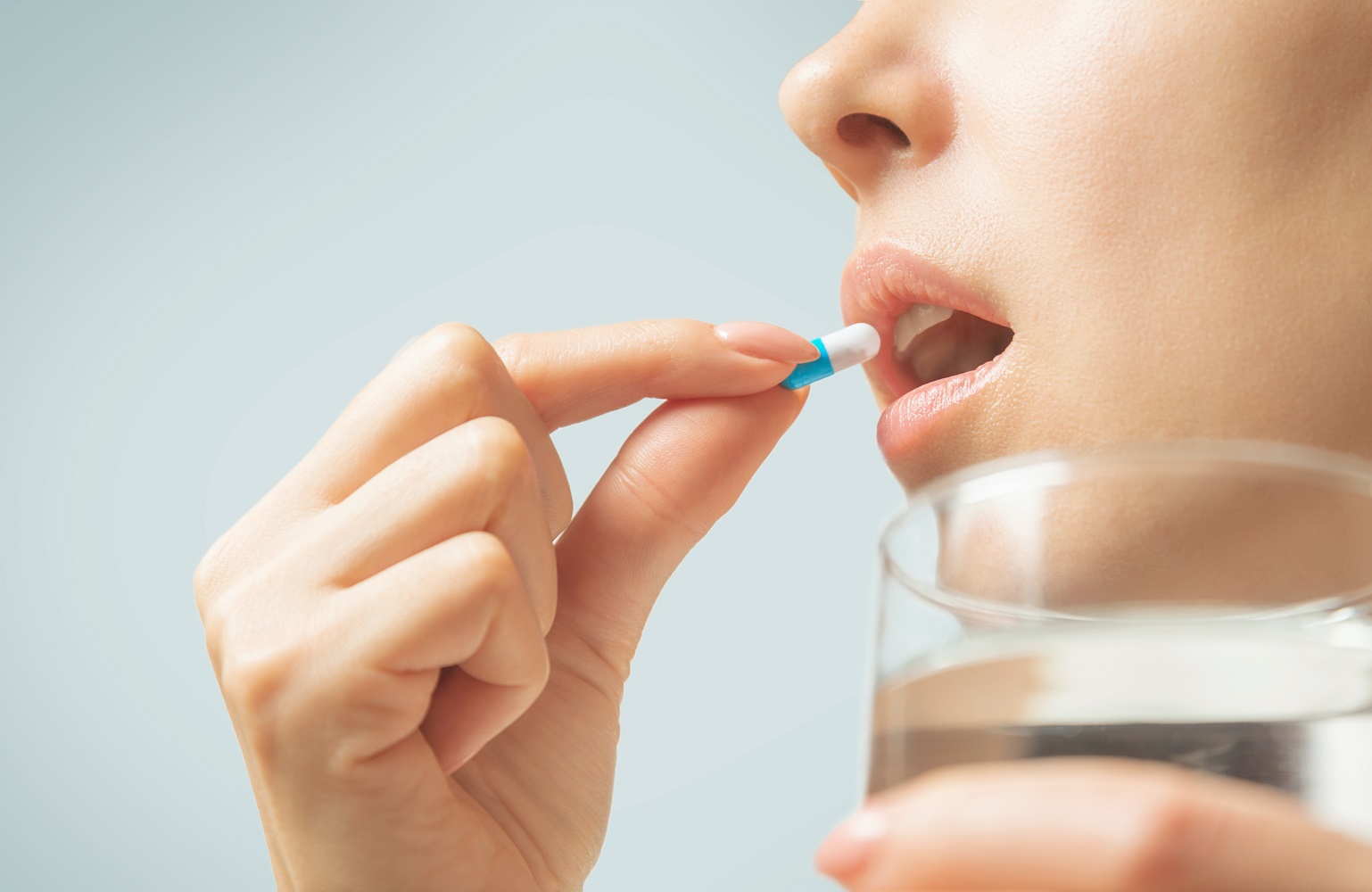
21 Apr The Link Between Medications and Cavities

Prescribed medications serve a purpose to help us manage a disease, ease pain, or heal from injury. In 2021, the Health Policy Institute reported that about 66% of U.S. adults were taking at least one prescription drug per day. More than 260 million users take over-the-counter (OTC) medications regularly – that’s nearly 9 of 10 Americans. Each medication serves a purpose, but medications can have their own side effects including dry mouth. Dry mouth is a condition that when left untreated, can lead to increased dental decay, cavities, and gum disease. Here are examples of medications that cause dry mouth with suggestions for how to treat it.
THE IMPORTANCE OF SALIVA
Certain medications like antihistamines provide relief to a host of allergy sufferers by drying out runny noses and watery eyes. While the histamine in these medications can dry out unwanted snuffles, it also has a whole-body drying effect including a decrease in saliva production.
Normally, our salivary glands produce 4-8 cups of saliva daily. Saliva is made of 98% water with 2% comprised of important substances such as enzymes to break down food and aid in the digestive process. Saliva also contains electrolytes for hydration, white blood cells, antimicrobial agents, and acid neutralizers to prevent tooth decay. A decrease in saliva production causes dry mouth which creates an environment for bacteria to thrive.
WHY DRY MOUTH CAUSES CAVITIES
Dry mouth happens when our salivary glands do not produce enough saliva. It can be caused by certain medications, but can also have causes that are not related to medication or illness. The effect of dry mouth is an increase in the length of time acids, food particles, and bacteria live in your mouth. Think of saliva as a rinsing and flushing tool for your mouth. It washes away the yucky stuff. As saliva decreases, bacteria remain in the mouth longer, creating an opportunity for them to multiply. Lack of moisture then causes soft tissue like gums to become inflamed, creating pockets where food particles and bacteria can live. This “under the gum” growth is often not found until the late stages, and left unchecked can progress to periodontal disease. Protect your teeth by understanding what causes dry mouth and how to treat it.
MEDICATIONS THAT CAUSE DRY MOUTH
According to The American Academy of Oral Medicine, over 1,110 medications have the potential to cause dry mouth. In addition to antihistamines and decongestants, here are a few other common examples:
Asthma
Bronchodilators ease breathing by relaxing muscle bands in the lungs. A critical medication for individuals with asthma or COPD, it can also cause dry mouth which can lead to dental cavities.
Painkillers
Painkillers with an opioid base are often prescribed to treat chronic or severe pain. These same opioids can also cause a drying effect on the entire body including the mouth.
Blood Pressure Medication
Beta-blockers, antihypertensive drugs, ACE inhibitors, calcium channel blockers, and vasodilators are types of medications prescribed for high blood pressure. Important for regulating blood pressure, these medications share a common side effect of dry mouth.
Diuretics
Diuretics, sometimes called water pills, promote an increase in urine production. This is done to decrease the amount of water and salt in the body and may be prescribed for a number of reasons. This increase in the excretion of water can cause dry mouth.
Other medications include high cholesterol, antidepressants, antacids, antianxiety, chemotherapy and radiation, and other disease-specific medications. Never stop taking medications prescribed by your doctor without their consent first. Instead, consider these simple methods to soothe a dry mouth.
WAYS TO RELIEVE DRY MOUTH
Alleviate dry mouth and protect against enamel eroding bacteria easily:
- Drink at least 8 – 12 ounces of water per day or as your doctor advises
- Rinse your mouth with water every 1-2 hours to flush out food particles and bacteria
- Stimulate saliva production with sugar-free gums, lozenges, or candy
- Rinse with an over-the-counter mouth moisturizer like Biotène®
- Add a humidifier at night to keep moisture in the air
- Avoid caffeine, alcohol, acidic and sugary drinks that can irritate dry mouth
- Talk to your physician about changing the medication or dose
Adhering to a twice-daily brushing and once-daily flossing routine will remove food particles and bacteria that can cause cavities. Visit your dentist twice per year for an annual checkup. Inform your dentist of all prescription and OTC medications you are taking. And remember, it’s never a good idea to diagnose yourself. Contact your doctor with any concerns.
At Imperial Dental Center, our goal is to provide the best dental care to our patients while ensuring their comfort and safety in our care. Contact us today at (281) 265-3567 or schedule an online appointment to discuss any dental concerns you may have.

Dr. Dragana Angelova
We Love to See You Smile

